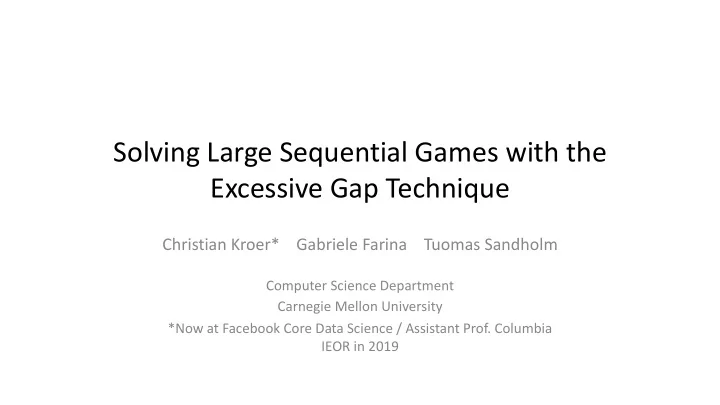

Solving Large Sequential Games with the Excessive Gap Technique Christian Kroer* Gabriele Farina Tuomas Sandholm Computer Science Department Carnegie Mellon University *Now at Facebook Core Data Science / Assistant Prof. Columbia IEOR in 2019
Extensive-Form Games
Applications - poker Nash Equilibrium approximation used in recent breakthroughs – Heads-Up Limit Texas Hold’Em [Bowling et al. 2015] – Heads-Up No-Limit Texas Hold’Em [Brown and Sandholm 2017, Moravcik et al. 2017] CFR, or variants, used to compute equilibria
How compute a zero-sum Nash equilibrium Linear programming [von Stengel 96] Simplex and IPM too slow in practice CFR and variants [Zinkevich et al. 07, Tammelin et al 15] ! " in theory Better than ! " in practice First-order methods, [Hoda et al 10, Kroer et al 18] ! " in theory ! " in practice
Practical Excessive Gap Technique We introduce a practical variant of EGT EGT constructs smoothed approximations to the optimization problems faced by each player [Nesterov 05, Hoda et al 10, – Kroer et al 18] We use dilated entropy DGF from [Kroer et al 18] – Aggressive stepsizing – Balancing of smoothing on each player – Numerically-friendly smoothed best response computation – GPU parallelization across different hands dealt –
Experiments Real-time subgames from Brains vs AI competition Last betting round of game 43k/86k actions per player, 54M leaves EGT with Kroer et al 18 smoothing function Our Aggressive EGT Three CFR variants
Comparison to existing algorithms Endgame 7 10 3 CFR + EGT ✏ (regret sum) [mbb] EGT/ AS 10 2 CFR(RM) CFR(RM + ) 10 1 10 0 10 − 1 10 − 2 10 − 3 10 1 10 2 10 3 10 4 10 5 Gradient computations
Conclusion • We introduce aggressive EGT variant • Give first comparison of FOMs and CFR on real, large-scale games • First-order methods can be made faster than all but the best practical variant of CFR Christian Kroer, ckroer@cs.cmu.edu, Paper at www.christiankroer.com/publications
Recommend
More recommend